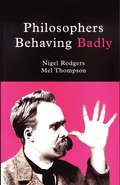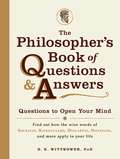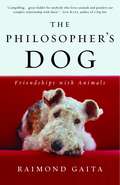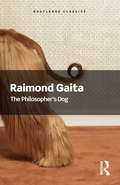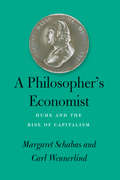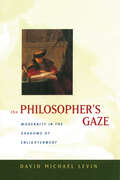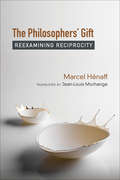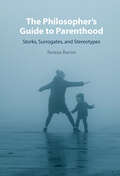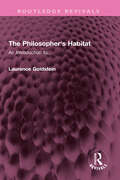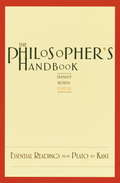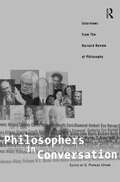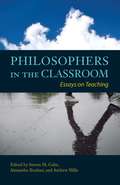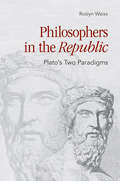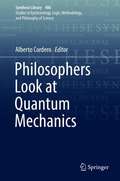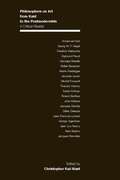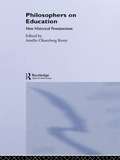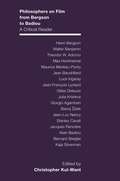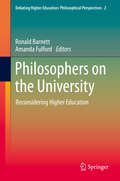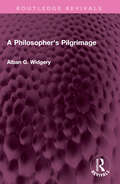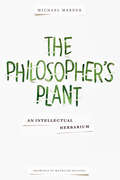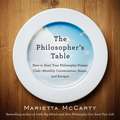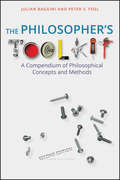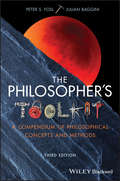- Table View
- List View
Philosophers Behaving Badly
by Mel Thompson Nigel RodgersAn engaging and often hilarious survey of the far-from-fusty extra-curricular activities of some of philosophy's finest practitioners Philosophers Behaving Badly examines the lives of eight great philosophers--Rousseau, whose views on education and the social order seem curiously at odds with his own outrageous life; Schopenhauer and Nietzsche, two giants of the 19th century whose words seem ever more relevant today; and five immensely influential philosophers of the 20th century, Russell, Wittgenstein, Heidegger, Sartre, and Foucault.
The Philosopher's Book of Questions and Answers
by D. E. WittkowerYour life through the lens of the world's greatest thinkers! Do you ever wonder how important money really is in life or what you need to do to achieve happiness? With The Philosopher's Book of Questions and Answers, you will be one step closer to solving these uncertainties. Inside, you'll find the basics of philosophy, written in plain English, and thoughts for applying these important theories to your own life. You'll also be encouraged to dig deep into the philosophical reasoning behind your everyday actions with a series of fascinating prompts, such as: If you had ten times your wealth and ten times your income, what would you do then that you can't do now? What's a version of that activity that you could do right now? Is it ten times less meaningful, important, or enjoyable than the activity you would do with more money? From Socrates and Epicurean to Kierkegaard and Nietzsche, The Philosopher's Book of Questions and Answers will not only help you grasp history's greatest thoughts, but will also unveil the world in a whole new light.
The Philosopher's Book of Questions and Answers
by D. E. WittkowerYour life through the lens of the world's greatest thinkers! Do you ever wonder how important money really is in life or what you need to do to achieve happiness? With The Philosopher's Book of Questions and Answers, you will be one step closer to solving these uncertainties. Inside, you'll find the basics of philosophy, written in plain English, and thoughts for applying these important theories to your own life. You'll also be encouraged to dig deep into the philosophical reasoning behind your everyday actions with a series of fascinating prompts, such as: If you had ten times your wealth and ten times your income, what would you do then that you can't do now? What's a version of that activity that you could do right now? Is it ten times less meaningful, important, or enjoyable than the activity you would do with more money? From Socrates and Epicurean to Kierkegaard and Nietzsche, The Philosopher's Book of Questions and Answers will not only help you grasp history's greatest thoughts, but will also unveil the world in a whole new light.
The Philosopher's Book of Questions & Answers: Questions to Open Your Mind
by D. E. WittkowerYour life through the lens of the world's greatest thinkers!Do you ever wonder how important money really is in life or what you need to do to achieve happiness? With The Philosopher's Book of Questions and Answers, you will be one step closer to solving these uncertainties. Inside, you'll find the basics of philosophy, written in plain English, and thoughts for applying these important theories to your own life. You'll also be encouraged to dig deep into the philosophical reasoning behind your everyday actions with a series of fascinating prompts, such as:If you had ten times your wealth and ten times your income, what would you do then that you can't do now?What's a version of that activity that you could do right now?Is it ten times less meaningful, important, or enjoyable than the activity you would do with more money? From Socrates and Epicurean to Kierkegaard and Nietzsche, The Philosopher's Book of Questions and Answers will not only help you grasp history's greatest thoughts, but will also unveil the world in a whole new light.
The Philosopher's Dog: Friendships with Animals
by Raimond GaitaThe philosopher Raimond Gaita has always been fascinated by animals– their obvious intelligence and disturbing brutality, their uncanny responsiveness to our moods and needs, the deep feelings they elicit from us and seem to return. In this marvelous, luminous book, Gaita trains the lens of philosophy on the mystery and beauty of the animals he has known and loved best. The Philosopher’s Dogis one of those rare works that engage the heart from the very first paragraph and haunt the mind long after one has finished reading. What does Gaita’s dog, Gypsy, think about while she sits on her mat gazing out to sea for hours on end? Why did the irascible cockatoo Jack greet Gaita’s father with kisses each morning but bite everyone else? How can we acknowledge that animals are sentient and yet deny that they have consciousness? Is it possible to love animals and still eat meat? In contemplating questions like these, Gaita weaves together personal stories–inspiring, sometimes heartbreaking accounts about the animals he and his family members have sheltered–with the reflections and analysis of a professional philosopher. A graceful, engaging stylist, Gaita is perfectly lucid as he grapples with great thinkers through the ages–from Socrates to Wittgenstein, Descartes to Hannah Arendt. And yet, as important as formal philosophy has been to him, Gaita frankly acknowledges that he has learned much about the nature of life from Gypsy and Jack and his courageously arrogant cat Tosca. In the end, he argues that love should be the essence of our bond with animals, the critical factor that guides how we treat them and think about their place in our world. In pondering the meaning and morality of his relationships with animals, and with the natural world more generally, Raimond Gaita has created a surprising masterpiece, a book of startling insights, spellbinding stories, meticulous observations, and wise reflection. At once engrossing and thought-provoking,The Philosopher’s Dog is a supremely enjoyable book. From the Hardcover edition.
The Philosopher's Dog (Routledge Classics)
by Raimond GaitaIn this beautifully written book Raimond Gaita tells inspirational, poignant, sometimes funny but never sentimental stories of the dogs, cats and cockatoos that lived and died within his own family. He asks fascinating questions about animals: Is it wrong to attribute the concepts of love, devotion, loyalty, grief or friendship to them? Why do we care so much for some creatures but not for others? Why are we so concerned with proving that animals have minds? Reflecting on these questions, and drawing on the ideas of Descartes, Wittgenstein and J.M. Coetzee, Gaita pleads that we ask ourselves what it means to be creatures of ‘flesh and blood.’ He discusses mortality and sexuality, the relations between storytelling, philosophy and science and the spiritual love of mountains. An arresting and profound book, The Philosopher’s Dog is a triumph of both storytelling and philosophy. This Routledge Classics edition includes a substantial new introduction and afterword by the author.
A Philosopher's Economist: Hume and the Rise of Capitalism
by Margaret Schabas Carl WennerlindAlthough David Hume’s contributions to philosophy are firmly established, his economics has been largely overlooked. A Philosopher’s Economist offers the definitive account of Hume’s “worldly philosophy” and argues that economics was a central preoccupation of his life and work. Margaret Schabas and Carl Wennerlind show that Hume made important contributions to the science of economics, notably on money, trade, and public finance. Hume’s astute understanding of human behavior provided an important foundation for his economics and proved essential to his analysis of the ethical and political dimensions of capitalism. Hume also linked his economic theory with policy recommendations and sought to influence people in power. While in favor of the modern commercial world, believing that it had and would continue to raise standards of living, promote peaceful relations, and foster moral refinement, Hume was not an unqualified enthusiast. He recognized many of the underlying injustices of capitalism, its tendencies to promote avarice and inequality, as well as its potential for political instability and absolutism. Hume’s imprint on modern economics is profound and far reaching, whether through his close friend Adam Smith or later admirers such as John Maynard Keynes and Friedrich Hayek. Schabas and Wennerlind’s book compels us to reconsider the centrality and legacy of Hume’s economic thought—for both his time and ours—and thus serves as an important springboard for reflections on the philosophical underpinnings of economics.
The Philosopher's Gaze: Modernity in the Shadows of Enlightenment
by David Michael LevinDavid Michael Levin's ongoing exploration of the moral character and enlightenment-potential of vision takes a new direction in The Philosopher's Gaze. Levin examines texts by Descartes, Husserl, Wittgenstein, Nietzsche, Heidegger, Benjamin, Merleau-Ponty, and Lévinas, using our culturally dominant mode of perception and the philosophical discourse it has generated as the site for his critical reflections on the moral culture in which we are living.In Levin's view, all these philosophers attempted to understand, one way or another, the distinctive pathologies of the modern age. But every one also attempted to envision—if only through the faintest of traces, traces of mutual recognition, traces of another way of looking and seeing—the prospects for a radically different lifeworld. The world, after all, inevitably reflects back to us the character, the reach and range, of our vision.In these provocative essays, the author draws on the language of hermeneutical phenomenology and at the same time refines phenomenology itself as a method of working with our experience and thinking critically about the culture in which we live.
The Philosophers' Gift: Reexamining Reciprocity
by Marcel HénaffWinner, French Voices Award for excellence in publication and translation.When it comes to giving, philosophers love to be the most generous. For them, every form of reciprocity is tainted by commercial exchange. In recent decades, such thinkers as Derrida, Levinas, Henry, Marion, Ricoeur, Lefort, and Descombes, have made the gift central to their work, haunted by the requirement of disinterestedness.As an anthropologist as well as a philosopher, Hénaff worries that philosophy has failed to distinguish among various types of giving. The Philosophers’ Gift returns to Mauss to reexamine these thinkers through the anthropological tradition. Reciprocity, rather than disinterestedness, he shows, is central to ceremonial giving and alliance, whereby the social bond specific to humans is proclaimed as a political bond. From the social fact of gift practices, Hénaff develops an original and profound theory of symbolism, the social, and the relationship between self and other, whether that other is an individual human being, the collective other of community and institution, or the impersonal other of the world.
The Philosopher's Guide to Parenthood: Storks, Surrogates, and Stereotypes
by Teresa BaronOur understanding of what it means to be a parent in any given context is shaped by our biological, social, legal, and moral concepts of parenthood. These are themselves subject to the influence of changing expectations, as new technologies are produced, cultural views of the family are transformed, and laws shift in response. In this book Teresa Baron provides a detailed and incisive overview of the key questions, widespread presuppositions, and dominant approaches in the field of philosophy of parenthood. Baron examines paradigm cases and problem cases alike through an interdisciplinary lens, bringing philosophy of parenthood into dialogue with research on family-making and childrearing from across the social sciences and humanities. Her book aims to answer old questions, draw out new questions, and interrogate notions that we often take for granted in this field, including the very concept of parenthood itself.
The Philosopher's Habitat: An Introduction to... (Routledge Revivals)
by Laurence GoldsteinFirst published in 1990 The Philosopher's Habitat introduces the subject by investigating a variety of the problems which are currently engaging philosophers, and which can be made intelligible to an absolute beginner. Rather than introducing philosophy by examining, in the traditional way, the writings of great philosophers, the author has inverted this procedure. The idea is that the reader will become absorbed in these dramas, will thereby come to appreciate the ways in which the stage was set by the great writers of the past, and will feel the urge to participate. Questions at the end of each chapter encourage the reader to push beyond the text. This book is a must read for students of philosophy.
The Philosopher's Handbook: Essential Readings from Plato to Kant
by Stanley RosenAn ideal introduction for the casual reader and a beneficial reference for the student,The Philosopher's Handbookfeatures the writings of some of the world's most influential philosophers. Based on the premise that all human beings are curious about their existence, Rosen's collection brings together primary excerpts from the works of prominent thinkers such as Plato, Nietzsche, Descartes, Machiavelli, and Kant. Experts in each field have carefully selected the sources and provided brief introductions to help readers gain insight into the readings. Newly revised in order to emphasize its broad appeal,The Philosopher's Handbookis a solid introduction to Western philosophy for all inquiring minds.
Philosophers in Conversation: Interviews from the Harvard Review of Philosophy
by S. Phineas UphamThis volume brings together 13 interviews with some of the brightest names in contemporary philosophy, including W.V.O. Quine, Richard Rorty, Stanley Cavell, Hilary Putnam, as well as John Rawls. Covering a wide range of topics from the philosophy of law and logic to metaphysics to literature, the interviews in this text provide an introduction to
Philosophers in the Classroom: Essays on Teaching
by Steven M. Cahn Alexandra Bradner Andrew P. MillsIn these essays, 24 of our most celebrated professors of philosophy address the problem of how to teach philosophy today: how to make philosophy interesting and relevant; how to bring classic texts to life; how to serve all students; and how to align philosophy with more "practical" pursuits. Selected and introduced by three leaders in the world of philosophical education, the insights contained in this inspiring collection illuminate the challenges and possibilities of teaching the academy’s oldest discipline.
Philosophers in the Republic: Plato's Two Paradigms
by Roslyn WeissIn Plato's Republic, Socrates contends that philosophers make the best rulers because only they behold with their mind's eye the eternal and purely intelligible Forms of the Just, the Noble, and the Good. When, in addition, these men and women are endowed with a vast array of moral, intellectual, and personal virtues and are appropriately educated, surely no one could doubt the wisdom of entrusting to them the governance of cities. Although it is widely-and reasonably-assumed that all the Republic's philosophers are the same, Roslyn Weiss argues in this boldly original book that the Republic actually contains two distinct and irreconcilable portrayals of the philosopher.According to Weiss, Plato's two paradigms of the philosopher are the "philosopher by nature" and the "philosopher by design." Philosophers by design, as the allegory of the Cave vividly shows, must be forcibly dragged from the material world of pleasure to the sublime realm of the intellect, and from there back down again to the "Cave" to rule the beautiful city envisioned by Socrates and his interlocutors. Yet philosophers by nature, described earlier in the Republic, are distinguished by their natural yearning to encounter the transcendent realm of pure Forms, as well as by a willingness to serve others-at least under appropriate circumstances. In contrast to both sets of philosophers stands Socrates, who represents a third paradigm, one, however, that is no more than hinted at in the Republic. As a man who not only loves "what is" but is also utterly devoted to the justice of others-even at great personal cost-Socrates surpasses both the philosophers by design and the philosophers by nature. By shedding light on an aspect of the Republic that has escaped notice, Weiss's new interpretation will challenge Plato scholars to revisit their assumptions about Plato's moral and political philosophy.
Philosophers Look at Quantum Mechanics (Synthese Library #406)
by Alberto CorderoThis edited volume explores the philosophical implications of quantum mechanics. It features papers from venues of the International Ontology Congress (IOC) up to 2016. IOC is a worldwide platform for dialogue and reflection on the interactions between science and philosophy.The collection features philosophers as well as physicists, including David Albert, Harvey Brown, Jeffrey Bub, Otávio Bueno, James Cushing, Steven French, Victor Gomez-Pin, Carl Hoefer, Simon Kochen, Peter Lewis, Tim Maudlin, Peter Mittlestatedt, Roland Omnès, Juha Saatsi, Albert Solé, David Wallace, and Anton Zeilinger.Since the early days of quantum mechanics, philosophers have studied the subject with growing technical skill and fruitfulness. Their efforts have unveiled intellectual bridges between physics and philosophy. These connections have helped fuel the contemporary debate about the scope and limits of realism and understanding in the interpretation of physical theories and scientific theories in general. The philosophical analysis of quantum mechanics is now one of the most sophisticated and productive areas in contemporary philosophy, as the papers in this collection illustrate.
Philosophers on Art from Kant to the Postmodernists: A Critical Reader
by Christopher Kul-WantHere, for the first time, Christopher Kul-Want brings together twenty-five texts on art written by twenty philosophers. Covering the Enlightenment to postmodernism, these essays draw on Continental philosophy and aesthetics, the Marxist intellectual tradition, and psychoanalytic theory, and each is accompanied by an overview and interpretation. The volume features Martin Heidegger on Van Gogh's shoes and the meaning of the Greek temple; Georges Bataille on Salvador Dalí's The Lugubrious Game; Theodor W. Adorno on capitalism and collage; Walter Benjamin and Roland Barthes on the uncanny nature of photography; Sigmund Freud on Leonardo Da Vinci and his interpreters; Jacques Lacan and Julia Kristeva on the paintings of Holbein; Freud's postmodern critic, Gilles Deleuze on the visceral paintings of Francis Bacon; and Giorgio Agamben on the twin traditions of the Duchampian ready-made and Pop Art. Kul-Want elucidates these texts with essays on aesthetics, from Hegel and Nietzsche to Badiou and Rancière, demonstrating how philosophy adopted a new orientation toward aesthetic experience and subjectivity in the wake of Kant's powerful legacy.
Philosophers on Education: New Historical Perspectives
by Amélie Oksenberg RortyPhilosophers on Education offers us the most comprehensive available history of philosopher's views and impacts on the directions of education. As Amelie Rorty explains, in describing a history of education, we are essentially describing and gaining the clearest understanding of the issues that presently concern and divide us.The essays in this stellar collection are written by some of the finest comtemporary philosophers. Those interested in history of philosophy, epistemology, moral psychology and education, and political theory will find Philosophers on Education to be both an engaging and fascinating read.
Philosophers on Film from Bergson to Badiou: A Critical Reader
by Christopher Kul-WantPhilosophers on Film from Bergson to Badiou is an anthology of writings on cinema and film by many of the major thinkers in continental philosophy. The book presents a selection of fundamental texts, each accompanied by an introduction and exposition by the editor, Christopher Kul-Want, that places the philosophers within a historical and intellectual framework of aesthetic and social thought.Encompassing a range of intellectual traditions—Marxism, phenomenology, psychoanalysis, poststructuralism, gender and affect theories—this critical reader features writings by Bergson, Benjamin, Adorno and Horkheimer, Merleau-Ponty, Baudrillard, Irigaray, Lyotard, Deleuze, Kristeva, Agamben, Žižek, Nancy, Cavell, Rancière, Badiou, Stiegler, and Silverman. Many of the texts discuss cinema as a mass medium; others develop phenomenological analyses of particular films. Reflecting upon the potential of films to challenge dominant forms of ideology, the anthology considers the ways in which they can disrupt the clichés of capitalist images and offer radical possibilities for creating new worlds of visceral experience outside the grasp of habitual forms of knowledge and subjectivity. Ranging from the early silent period of cinema through the classics of European and Hollywood cinema to the early twenty-first century, the films discussed offer a vivid sense of these philosophers’ concepts and ideas, casting new light on the history of cinema. This reader is an essential and valuable resource for a wide range of courses in film and philosophy.
Philosophers on the University: Reconsidering Higher Education (Debating Higher Education: Philosophical Perspectives #2)
by Ronald Barnett Amanda FulfordThis book shows the significance of the thinking of philosophers (and other key thinkers) in understanding the university and higher education. Through those explorations, it widens and substantially adds to the emerging philosophy of higher education. It builds on the historical literature on the idea of the university, and provides higher education scholars with highly accessible introductions to the thinking of key philosophers and thinkers, alerting them to a set of literature that otherwise might not be encountered. Until very recently, most of the debate on higher education – both in the public domain and in the scholarly literature – has been conducted with little regard to the philosophical literature. This is odd for two reasons. Firstly, much of the historical literature on the idea of the university – over the past two hundred years – has been written by philosophers and their thinking has largely gone unmined. Second, and perhaps even more importantly, many of the issues in the higher education debate are either philosophical in their nature, or require reflective thinking, and there lies to hand huge resources in the philosophical literature that can help in working through those issues. Issues such as what is to count as knowledge (in the university), wisdom, voice, democracy, culture, what it is to ‘be’ a student or academic, academic freedom, communication, work and disciplinarity cry out for the kind of insights that the philosophical literature – very broadly understood – can offer. This book attempts precisely to do this, to show how the work of key thinkers can help in deepening the higher education debate. Each chapter focuses on an individual thinker, giving both an insight into the thinker in question and accessibly drawing out something of their thinking and showing its significance in understanding the university and higher education. The editors provide a full-length introduction that marks out this large territory and prepares the ground for the reader.The book impressively builds a rich meshwork of careful and thorough thinking around the university and higher education by way of introducing 14 important philosophers on timely subjects such as culture and the university, higher education and democracy, and the role of the university. The volume is a great contribution to the important task of deepening the debate about higher education and the university, through introducing important philosophers in ways that might help the university and higher education work through some of the issues and challenges that it is currently facing. As such, this book is essential reading for anyone wanting to wander and wonder deeper into the core purposes and possibilities of higher education in the good companionship of outstanding thinkers and distinguished academics on these matters. A playground for philosophical thought and adventure.Rikke Toft Nørgård, Associate Professor, Aarhus University, Denmark'This book is an excellent introduction to a wide range of famous thinkers and what they have to say about the university and higher education today. It goes beyond the contemporary preoccupation with metrics, based on managerialism, and takes a much needed philosophical look at what higher education should be, or should aspire to be.'Assoc. Prof. Stephen Loftus, Foundational Medical Studies, Oakland University William Beaumont School of Medicine, USA
A Philosopher's Pilgrimage (Routledge Revivals)
by Alban G. WidgeryFirst Published in 1961 A Philosopher's Pilgrimage is a plain-spoken autobiography of Alban G. Widgery. This is the record of the life of a philosopher who never allowed concern with ideas to distract him from the richness of experiences. He was a student, colleague and friend of some of the leading personalities of the last half century. Having lived in England, Scotland, Germany, France, India, Hawaii, and the United States, he formed definite impressions of their peoples. In India, on the personal staff of H.H. Sayaji Rao III, he greatly influenced him in his pioneer achievements. Associated with Hindus, Buddhists, Parsis, Muslims, and Jews, he came to appreciate essentials of their faiths. He critically considered the teachings of such thinkers as Nietzsche, Tolstoy, and Shaw. With a clarity of exposition and with humour he presents a philosophy of life worthy of serious consideration. This book will be of interest to students of philosophy.
The Philosopher's Plant: An Intellectual Herbarium
by Michael MarderDespite their conceptual allergy to vegetal life, philosophers have used germination, growth, blossoming, fruition, reproduction, and decay as illustrations of abstract concepts; mentioned plants in passing as the natural backdrops for dialogues, letters, and other compositions; spun elaborate allegories out of flowers, trees, and even grass; and recommended appropriate medicinal, dietary, and aesthetic approaches to select species of plants.In this book, Michael Marder illuminates the vegetal centerpieces and hidden kernels that have powered theoretical discourse for centuries. Choosing twelve botanical specimens that correspond to twelve significant philosophers, he recasts the development of philosophy through the evolution of human and plant relations. A philosophical history for the postmetaphysical age, The Philosopher's Plant reclaims the organic heritage of human thought. With the help of vegetal images, examples, and metaphors, the book clears a path through philosophy's tangled roots and dense undergrowth, opening up the discipline to all readers.
The Philosopher's Table: How to Start Your Philosophy Dinner Club--Monthly Conversation, Music, and Recipes
by Marietta Mccarty"Talk doesn't cook rice. " -Chinese Proverb According to Socrates, knowledge is "food for the soul. " That's all well and good for the Socratic but, according to Maslow, food for the stomach is a far more pressing matter. But why can't you have your talk, and cook rice too? With The Philosopher's Table, Marietta McCarty shows you that you can. In this book, you will find all of the necessary ingredients to start a Philosophy Dinner Club, taking a monthly tour around the world with friends to sample hors d'oeuvres of succulent wisdom and fill your plate with food from each philosophers' home country. With recipes, theories, and insights both old and new-all peppered with McCarty's charming and informative prose-you and your friends will: -Enjoy fresh homemade lamb meatballs and tzatziki, and the simple pleasures of life in Epicurus's ancient Greek garden. -Practice nonviolence (in life and at the dinner table) while sharing tofu curry with Burma's Aung San Suu Kyi. -Learn the fundamentals of rational decision-making with a mouthful of bratwurst from Germany's Immanuel Kant -In the spirit of accepting change, ditch the familiar take-out containers and dine on homemade shrimp dumplings with China's Lao Tzu. -And so much more! Complete with McCarty's recommendations for ethnic music from each region to enjoy during your gatherings and discussion questions to prompt debate, The Philosopher's Table contains everything you need to leave your host's home brimming with both nutritional and mental satisfaction. .
The Philosopher's Toolkit
by Julian Baggini Peter S. FoslThe second edition of this popular compendium provides the necessary intellectual equipment to engage with and participate in effective philosophical argument, reading, and reflectionFeatures significantly revised, updated and expanded entries, and an entirely new section drawn from methods in the history of philosophyThis edition has a broad, pluralistic approach--appealing to readers in both continental philosophy and the history of philosophy, as well as analytic philosophyExplains difficult concepts in an easily accessible manner, and addresses the use and application of these conceptsProven useful to philosophy students at both beginning and advanced levels
The Philosopher's Toolkit: A Compendium of Philosophical Concepts and Methods (Wiley Desktop Editions Ser.)
by Julian Baggini Peter S. FoslA new edition of the bestselling guide to the study of philosophy: the ideal intellectual ‘toolkit’ for sharpening analytical skills and building philosophical acuity Whether used as a guide to basic principles or a resource for key concepts and methods, The Philosopher's Toolkit equips readers with all the intellectual ‘tools’ necessary for engaging closely with philosophical argument and developing fluency in the methods and language of philosophical inquiry. Featuring accessible explanations, practical examples, and expert guidance, this text empowers readers to understand traditional philosophical thinking and to engage with new ideas. Focuses on the practical methods and concepts necessary for philosophical inquiry Presents a versatile resource for both novice and advanced students in areas of philosophy, critical theory, and rhetoric Adopts a pluralistic approach to teaching philosophy, making this a suitable resource for many courses Delivers extensive cross-referenced entries, recommended readings, and updated online resources Covers an array of topics, from basic tools of argumentation to sophisticated philosophical principles Fully revised and updated to include new topics and entries as well as expanded recommended reading lists to encourage further study
